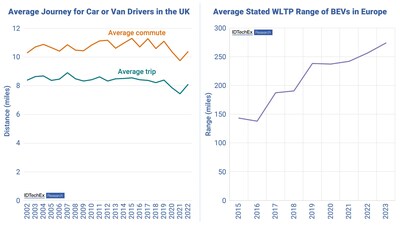IDTechEx Takes a Look at the New Range Records Set for Hydrogen Cars and Why It May Not Matter
The first record set was for the longest journey in the UK on a single tank of hydrogen at 406 miles using an ix35 FC. The second was the longest continuous journey in a hydrogen car, covering 6,000 miles over 6 days around the M25 in London. It should be noted there are a few other hydrogen cars that have stated ranges above this figure. However, being a fairly typical SUV, the ix35 is not a vehicle designed for the ultimate driving range at all costs but a realistic vehicle for private ownership.
To put this in perspective against battery electric vehicles (BEVs), according to IDTechEx research, the average stated range of a BEV sold in Europe in 2023 was 274 miles. Of course, this is stated, and many will be aware that the driving use case and weather conditions will significantly impact this figure.
Is it needed?
But the argument is not whether FCEVs can achieve longer ranges than BEVs, which is widely known, but whether it is needed and, if the range is the ultimate factor, why haven't FCEVs had more success?
According to statistics compiled by the UK government, the average trip length for a car or van driver in 2022 was 8 miles. The average commute distance was 10 miles. These statistics have remained fairly consistent over the past 20 years. While this is just for the UK, the rest of Europe is somewhat similar, and even if the figures were doubled, this is still far below the range of EVs on the market. Assuming one can charge at home and/or at work, then a BEV will suit the vast majority of journeys. The few trips that people make above the range of their BEV will require a stop, but it is unlikely to be much longer than one would generally spend getting a coffee or a meal.
For those who cannot charge at home, a BEV certainly becomes less attractive, although this is not an insurmountable issue, with charging points being installed in lamp posts and car parks becoming more common. Hydrogen infrastructure is lacking, with fewer than 10 stations open to the public in the UK. Although similar arguments could be made for a lack of charging infrastructure 10 years ago, when the current consumer considers a vehicle, the lack of infrastructure for low-cost green hydrogen is a major barrier.
Do we need a single solution?
The fuel cell vs battery electric argument is a divisive one, with proponents strongly backing one side or the other, but that doesn't always need to be the case. Automotive OEMs like Toyota, Honda, and Hyundai are continuing to develop both battery electric and fuel cell cars, with the idea being that one solution will not suit every use case. There is also a fair amount of overlap with the drivetrain technology with FCEVs utilizing batteries and electric motors just like BEVs.
As technology continues to develop, the initial cost of FCEVs can decrease. Hydrogen infrastructure continues to be deployed (initially for more viable applications outside automotive refueling), but this greater availability of hydrogen could make refueling hydrogen cars more viable in the future.
IDTechEx predicts that battery electric cars will be the dominant zero-emission automotive technology in the future. While remaining in the minority, the scale-up of hydrogen infrastructure, key automotive OEMs backing the technology, and certain regions pushing for a hydrogen economy, IDTechEx predicts a 60-fold growth over the next 20 years for fuel cell vehicles across cars, trucks, vans, and buses.

IDTechEx's report, "Fuel Cell Electric Vehicles 2024-2044: Markets, Technologies, and Forecasts", provides technology and market insights into the adoption of fuel cell electric vehicles for the car, van, truck, and bus market, with analysis of drivers, barriers, players, models, and market forecasts for 2024-2044.
To find out more about this report, including downloadable sample pages, please visit www.IDTechEx.com/fuelcell.
For the full portfolio of electric vehicles market research from IDTechEx, please visit www.IDTechEx.com/Research/EV.
About IDTechEx:
IDTechEx provides trusted independent research on emerging technologies and their markets. Since 1999, we have been helping our clients to understand new technologies, their supply chains, market requirements, opportunities and forecasts. For more information, contact [email protected] or visit www.IDTechEx.com.
Images download:
https://www.dropbox.com/scl/fo/8lplpmif7c0djnpq1yk01/APkVOkNGNxlTAHlK4idVyvA?rlkey=1ht8nyupp3f4ujc5xde9fhdqy&dl=0
Media Contact:
Lucy Rogers
Sales and Marketing Administrator
[email protected]
+44(0)1223 812300
Social Media Links:
Twitter: www.twitter.com/IDTechEx
LinkedIn: www.linkedin.com/company/IDTechEx
![]() View original content:https://www.prnewswire.co.uk/news-releases/idtechex-takes-a-look-at-the-new-range-records-set-for-hydrogen-cars-and-why-it-may-not-matter-302119595.html
View original content:https://www.prnewswire.co.uk/news-releases/idtechex-takes-a-look-at-the-new-range-records-set-for-hydrogen-cars-and-why-it-may-not-matter-302119595.html





